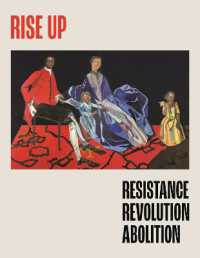- ホーム
- > 洋書
- > 英文書
- > Science / Mathematics
Full Description
In the early twentieth century, people in the southwestern Pacific nation of Vanuatu experienced rapid population decline, while in the early twenty-first century, they experienced rapid population growth. From colonial governance to postcolonial sovereignty, Moral Figures shows that despite attempts to govern population size and birth, reproduction in Vanuatu continues to exceed bureaucratic economization through Ni-Vanuatu insistence on Indigenous relationalities.
Through her examination of how reproduction is made public, Alexandra Widmer demonstrates how population sciences have naturalized a focus on women's fertility and privileged issues of wage labour over women's land access and broader social relations of reproduction. Widmer draws on oral histories with retired village midwives and massage healers on the changes to care for pregnancy and birth, as well as ethnographic research in a village outside the capital of Port Vila. Locating the Pacific Islands in global histories of demographic science and the medicalization of birth, the book presents archival material in a way that emphasizes bureaucratic practices in how colonial documents attempted to render Indigenous relationalities of reproduction governable.
While demographic imaginaries and biomedical practices increasingly frame fertility control as an investment in the reproductive health of individual bodies, the Ni-Vanuatu worlds presented in Moral Figures show that relationships between people, land, knowledge, kin, and care make reproduction a distributed and assisted process.
Contents
List of Illustrations
Map of the Pacific Ocean and Vanuatu
Map of South Efate
Map of Port Vila
Acknowledgments
Preface
Introduction
1. "The Shortage of Women Is the Cause of These Courts": Imbalanced Sex Ratios, Native Courts, and Marriage Disputes Made Public, 1910-1950
2. "The Nurses Looked Out for Us!": Hospital Births, Relational Infrastructures, and Public Concerns, 1950-1970
3. "It Will Help Planning for the Future": Making Men's and Women's "Subsistence" Public Knowledge in the First Census, 1966-1967
4. "I Just Wanted to Be Invisible": "Young Mothers" from Global Discourse to Village Experience, 2010-2020
5. "Well-Being for Melanesia": Alternative Indicators, Massage Healers, and Reciprocal Relationships, 2010-2020
Epilogue: Relations of Reproduction and Survival in the Anthropocene
Appendix 1: Population Size from 1850 to 2020
Appendix 2: Overview of Biomedical Health Services in Vanuatu in 1954
Works Cited








